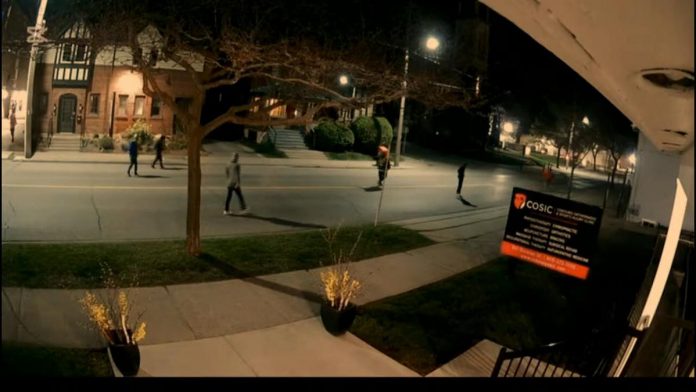
Cobourg schoolchildren have had rocks and racial slurs thrown at them. Two businesses have shut up shop and left downtown Cobourg. Some Division Street and area storekeepers and homeowners are dealing with drug paraphernalia, swearing, fights, and people urinating on their properties. Some residents say they are ultimately too scared to venture downtown anymore.
Those were a few comments the Town of Cobourg’s council heard during a town hall meeting Tuesday evening (June 17) that moved 42 people to register to make delegations and many more to gather at the Cobourg Community Centre.
Online, there were, at times, 180-plus people watching the YouTube livestream of the meeting, which lasted four hours. The town hosted the meeting to hear from Cobourg community members, business owners, and other stakeholders about their experiences over the past six months related to the emergency homeless shelter at 310 Division St. in Cobourg, which opened in December 2024.
On Wednesday, Northumberland County Council passed a motion during its regular council meeting directing changes to the operation of the emergency shelter, including closure of the ground-floor warming/cooling hub by July 4, development of options for relocating the warming/cooling hub to another location in the county, and preparation of a report for the July 30 social services committee meeting outlining the process and timelines to transition the shelter to a higher-barrier model focused on individuals with low-to-moderate complexity of needs.
“Thank you for taking the time this evening to join us for this important community conversation,” said Town of Cobourg Mayor Lucas Cleveland at the beginning of Tuesday’s town hall. “While the Town of Cobourg does not operate the shelter, we understand the significant impacts it has on our downtown and surrounding neighbourhoods.”
The meeting kicked off with residents sharing their thoughts and observations. One resident said it was her third delegation before council because “things are getting worse, not better, especially since 310 Division became a low-barrier shelter and was established downtown.”
After sharing a few examples of her encounters with people who are using drugs and people who support them, and the state of downtown washrooms in Rotary Park for instance, she said, “Cobourg is going down. We must protect residents and businesses or get dragged down with the drugs here and chaos.
“Perhaps it’s even time to declare a state of emergency.”

While the majority of speakers shared concerns related to the location and activities and operations related to the shelter, council also heard from people who appreciated the work that Transition House, which operates the shelter owned by Northumberland County, is doing to help people secure a roof overhead and food on their plates.
The town also heard from people who have been or are homeless, individuals who have been or are dealing with additions, along with people who work in the housing, mental health, and addictions realm.
“I’m on the front lines of these streets, working with the very people we are discussing here today,” said a speaker who works in the sector, including roles as a community programs facilitator with the Elizabeth Fry Society of Peterborough and a harm reduction worker with PARN.
She said she’s hearing from people she supports sentiments like, “it feels like it’s illegal for us to even exist. We are constantly and consistently told to move along, move along, move along. We have nowhere to sleep. We get discharged instead of transitioning. We need actual trauma-informed care with an actual trauma-informed councillor. We need more programs. We are people — not problems.”
One consistent theme was the wish to see the shelter be designated as a sober-living facility and not a low-barrier shelter.
“There is a clear pattern of increased chaotic behaviours on our property,” said Jeff Crowley, co-owner of Cobourg Orthopaedic & Sports Injury Clinic, which is located across the street from Transition House.
He said he or staff call police, by-law officials or security, between one and five times daily because of the “chaos.”
He shared videos of incidents, including one in which his wife and daughter exited the business to find someone urinating on the wall of their building. Crowley said swearing, people making threats, and drug deals unfolding in his business parking lot are also commonplace.
After the footage was shown, Crowley said, “raise the barrier,” which was met with applause.

Meanwhile, others said accessible, low-barrier supports are needed. Another common issue people raised was the desire to see the shelter located in a rural area and neither in the core of the business community nor within the close proximity of an elementary school, which is currently the case.
Some people suggested other towns and townships in Northumberland County should be required to take on more responsibility for addressing the issues of homelessness and addictions. The task shouldn’t all fall on Cobourg just because the bulk of services and supports are located in the west-end town, some said.
A former resident of Transition House said he is homeless and many people in his situation feel like there is no hope for their situations to improve because their income is what’s provided through the Ontario Disability Support Program or Ontario Works.
The meeting made it clear that the issue of support for people who are homeless and/or dealing with addictions was much broader than Transition House, and better services and systems are needed across the province and the country to have a meaningful impact on the crisis.
The Transition House homeless shelter, which moved from Chapel Street to 310 Division St., partially opened in December by offering short-term beds for those experiencing homelessness. It has since opened fully, offering additional services for those in need of longer-term housing support as well.
“The meeting is intended to be a community engagement opportunity for residents to share feedback, suggestions, or concerns regarding 310 Division St. with council,” Kara Eaule, the Town of Cobourg’s communications manager, recently told kawarthaNOW.
“Cobourg does not have a say in the operation of 310 Division Street. Therefore, Mayor Cleveland will take the community feedback to Northumberland County council where he hopes it can serve to inform positive change.”
The Division Street facility, which Northumberland County purchased in 2023 in partnership with Transition House, is intended to “modernize” shelter services, and serves as the only shelter of its kind in Northumberland County.
While Northumberland County council’s decision to direct operational changes to the shelter happened the morning after Tuesday’s town hall, a media release from the county states that the decision “follows months of public dialogue around the shelter model and service impacts, with council hearing from residents and businesses calling for changes to better balance support for vulnerable populations with broader community well-being.”
“These decisions were not made easily,” said county warden Brian Ostrander in the release. “Council has listened over the past seven months to a broad range of perspectives from across the community, on both the benefits the modernized shelter has delivered to date, as well as the challenges. We remain deeply committed to supporting individuals experiencing homelessness. We also recognize the need to respond to concerns raised by the broader community, in particular neighbours and business owners near 310 Division Street.”
While the 310 Division Street facility was designed to be a low-barrier shelter “to ensure the greatest level of access in response to increasingly complex needs,” the release states, it has been operating in an environment where addiction and mental health services are limited.
“The situation in Northumberland lays bare that addiction, mental illness, and housing affordability are intersecting crises impacting communities across Canada, not just large urban centres,” Ostrander said. “The reality is that small and rural municipalities like ours are increasingly on the front lines, with limited resources and limited authority to address what is fundamentally a health and housing crisis. While the operational changes we’ve made today may shift how local shelter services are delivered, the underlying issues remain.”
According to the release, county council recognized that transitioning to a higher-barrier shelter model will restrict access for some people currently using services at 310 Division Street, particularly those struggling with significant substance use and mental health concerns, but municipalities are unable to provide the specialized supports that are needed.
“Municipal governments cannot effectively address these crises on the backs of the property tax base,” the warden said. “We urgently need meaningful provincial investments in addiction treatment, detox, supportive housing, and mental health care. We continue to join our municipal counterparts across the province in calling on our provincial partners to address these issues with the funding and solutions that are desperately needed.”
The release states that county staff will begin working immediately with Transition House to develop the operational and contractual changes required to transition to the new high-barrier service model.


























